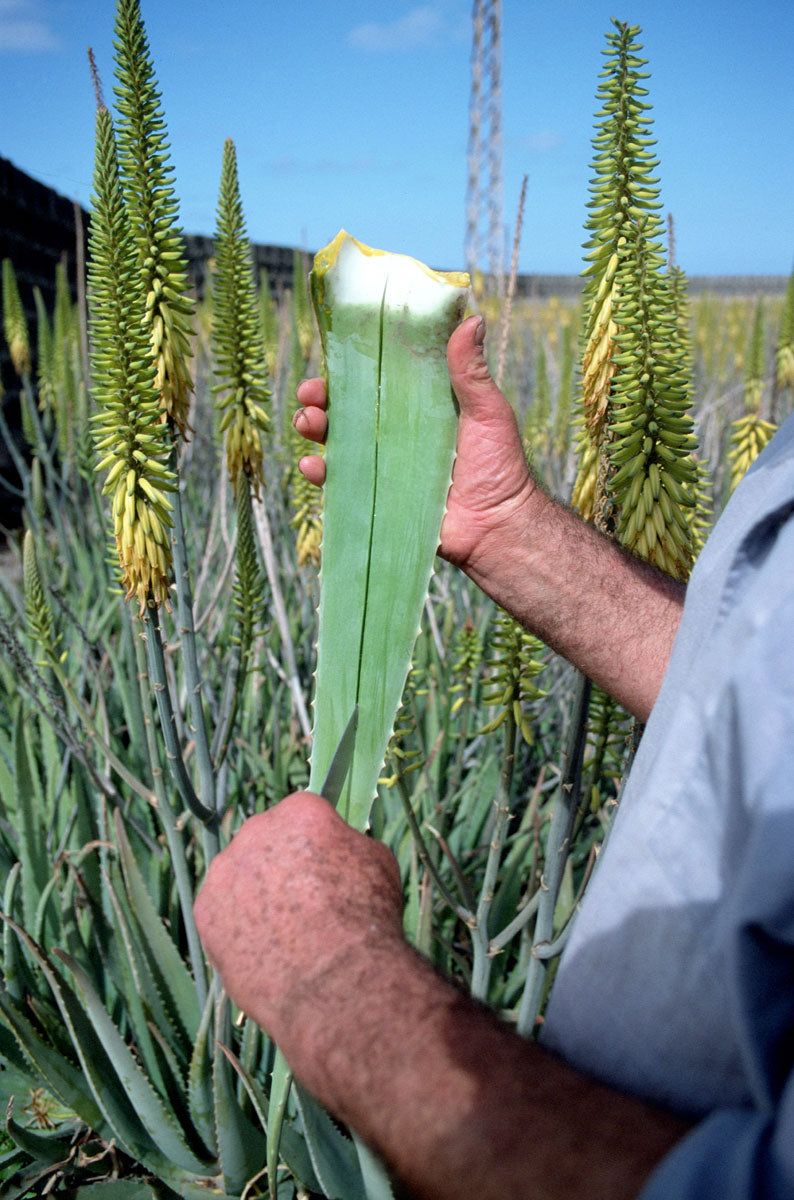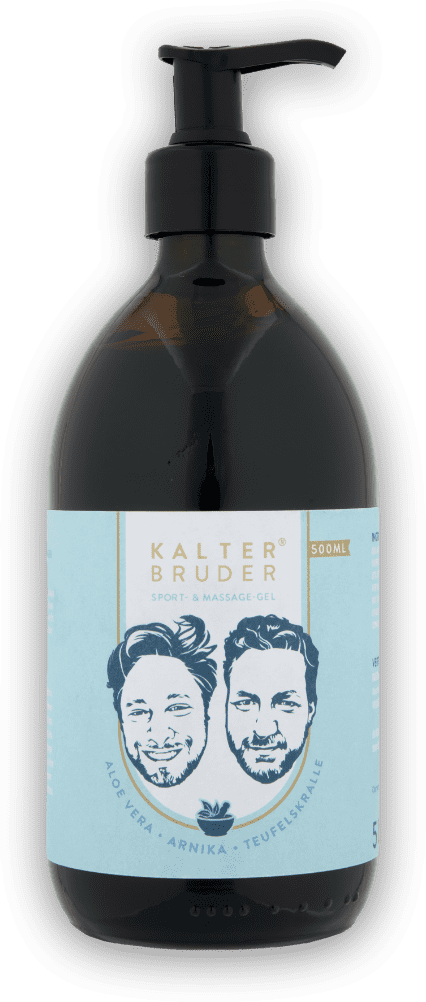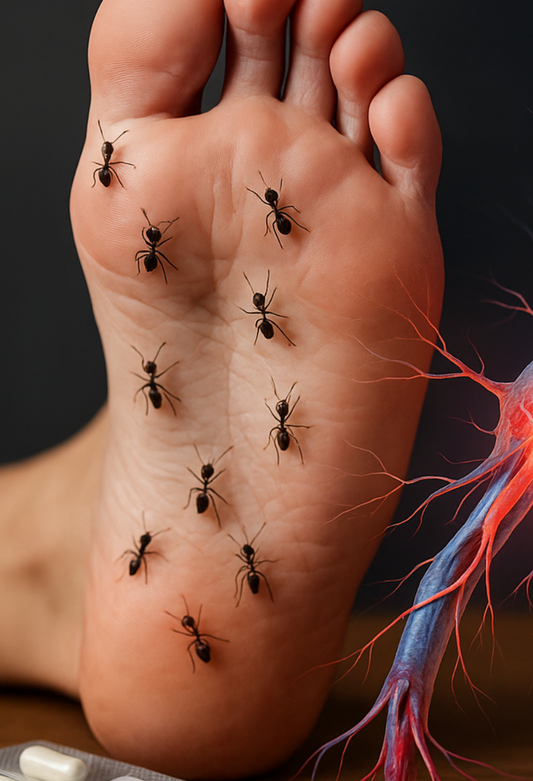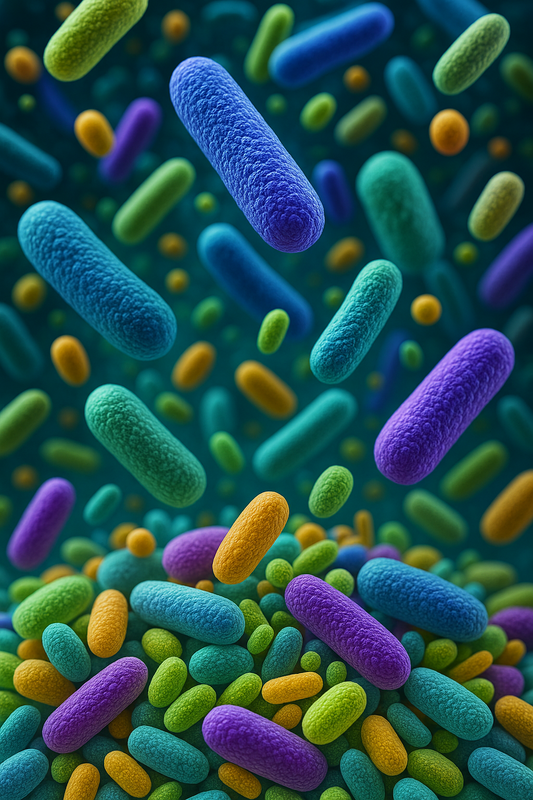Why you should definitely drink its juice and how to recognize high-quality aloe products.*
Aloe vera, which has been valued for its healing and nourishing properties for thousands of years, has had an impressive journey. Originally from the dry desert regions of Africa, it has spread over the millennia to gardens and windowsills all over the world. But how has this plant managed to occupy such a universal place in our culture and healthcare?
We really got to know aloe vera in Gran Canaria when we visited our laboratory on the island for the first time. It is the basic ingredient in the secret recipe for Kalter Bruder® and ensures that all the healing powers of our gel literally get under the skin - it is the means of transport, so to speak. At the same time, the plant itself also has many healing properties, which we will introduce to you in more detail in this article. For people suffering from restless legs, the cooling effect of aloe is a blessing, especially on warm nights. But its anti-inflammatory and pain-relieving properties are just as useful for them as they are for polyneuropathy patients.
However, aloe vera has the greatest magic for the body when used internally, usually in the form of drinks. In this article, we will explain why this is the case and where the healing powers are particularly effective in our organism.
Since there are a few things to consider when consuming aloe vera products, please read our warnings at the end of the article before taking them.
From the deserts of Africa to the hearts of cultures
Aloe vera is a plant that has deep roots in the hot, dry deserts of Africa. From there, it began its journey along ancient trade routes until it eventually conquered the hearts and homes of many cultures. The Egyptians revered it as the "plant of immortality," which is evident in the numerous writings and illustrations that depict aloe vera as a medicinal and skin care product. The plant also played a central role in traditional Chinese and Indian medicine, whether for treating skin diseases or promoting digestion.
Today, aloe vera is widespread throughout the world and is cultivated in many countries that offer hot, dry climates. It thrives particularly well in tropical and subtropical regions, where it is valued for its numerous uses in the cosmetic and health industries. But regardless of where it grows, its central role in human culture and health care remains unchanged.
Natural beauty and intensive care: The extraordinary effect of aloe vera on skin and hair
The cosmetics industry has long recognized aloe vera as one of its most valuable raw materials, and for good reason. Aloe vera gel penetrates deep into the skin, providing intensive moisture without leaving a greasy feeling. This unique property makes aloe vera the ideal care product for all skin types, but especially for those who struggle with dry or sensitive skin.
But the benefits of aloe vera don't end with moisturizing. It is also a proven remedy for skin irritations. Whether after sunbathing, for insect bites or minor cuts - aloe vera soothes the skin and promotes healing. Its anti-inflammatory properties, which are due to compounds such as salicylic acid, reduce redness and swelling. This is why aloe vera is an indispensable ingredient in many after-sun products and creams for sensitive skin.
But aloe vera can do even more: it helps fight the signs of aging. With its high concentrations of antioxidants, including vitamins C and E, it protects the skin from the damaging effects of free radicals that lead to premature aging. At the same time, it promotes collagen production, which is responsible for the elasticity and firmness of the skin. Regular use can significantly reduce the appearance of fine lines and wrinkles, making the skin appear smoother and more youthful.
Last but not least, aloe vera is also a real blessing for the hair. It acts as a natural conditioner that makes the hair soft and smooth while soothing the scalp. People who struggle with dandruff can especially benefit from the soothing properties of aloe vera. In addition, the plant promotes hair growth by supplying the hair follicles with important nutrients. The result is healthy, shiny hair that is easy to style and full of vitality.
Aloe Vera as a dietary supplement
Aloe vera has long since established itself not only as a cosmetic miracle cure, but also plays an important role in nutrition. Taken as a dietary supplement, aloe vera offers a variety of health benefits that go far beyond external use.
- Gastrointestinal: One of the most well-known uses of aloe vera is to aid digestion. Aloe vera juice has been used for centuries as a natural remedy to relieve digestive problems. The enzymes contained in the juice help to process nutrients efficiently, while the plant's soothing properties reduce inflammation in the gastrointestinal tract. For people suffering from constipation or irritable bowel syndrome, aloe vera can provide a gentle, natural solution.
- Detoxification: Aloe vera also supports the detoxification of the body. It contributes to overall health through its ability to rid the body of harmful toxins. Aloe vera promotes liver function and facilitates the elimination of waste products through the intestines, leading to improved well-being.
- Immune system: Another health highlight of aloe vera is its effect on the immune system. The plant's antioxidant properties help neutralize free radicals in the body that could weaken the immune system. At the same time, aloe vera supports the production of white blood cells, which are important for fighting off pathogens. This makes aloe vera a valuable addition to the daily diet, especially at times when the immune system needs extra protection.
- Blood sugar: For people with type 2 diabetes, aloe vera can also be of great benefit. Some studies have shown that aloe vera can regulate blood sugar levels, making it a potential support for people looking to stabilize their blood sugar. By lowering fasting blood sugar and HbA1c levels, aloe vera offers a natural complement to conventional treatment methods.
- Weight loss: Last but not least, aloe vera can also help with weight management. The juice of the plant has a mild laxative effect and stimulates the metabolism, which can help control weight and improve digestion. At the same time, aloe vera supports the absorption of nutrients, which makes the body work more efficiently and promotes general well-being.
Before taking Aloe Vera products, please read the important warnings at the end of the article.
Be careful in the supermarket: What you should definitely pay attention to when buying aloe products.
Be careful when buying aloe products in the supermarket, as not all products offer the expected quality and effectiveness. Many supposed aloe products contain only a minimal amount of real aloe vera gel and are instead enriched with a variety of fillers, preservatives and artificial fragrances that can significantly reduce the benefits of the aloe. A first look at the ingredient list is therefore essential:
- Real Gel: Make sure that aloe vera (ideally in the form of "Aloe Barbadensis Leaf Juice") is at the top of the ingredient list, as ingredients are usually listed in descending order of concentration. Many products marketed as "aloe vera gel" may contain water as the main ingredient and only a small percentage of real aloe vera gel.
- Aloe seal: You should also look for the certification seal of the International Aloe Science Council (IASC) , which confirms that the product contains a high proportion of pure aloe vera gel and meets strict quality standards.
- Colorants: Avoid products that contain artificial colorants, as pure aloe vera gel is actually clear to slightly yellowish – a green gel indicates additional, unnecessary colorants.
- Preservatives: Finally, it is advisable to choose products with natural preservatives such as vitamin E or grapefruit seed extract to ensure a longer shelf life without compromising the beneficial properties of aloe.
By consciously choosing high-quality aloe products, you can ensure that you achieve the best possible effect for your skin and health. However, you will also quickly realize that "real" aloe products have their price - an IASC-certified drinking gel from Schaebens costs around 16€ (1L).
When choosing a suitable product, please also note the warning at the end of the article.
Our tip: Refreshing aloe vera-lemon-mint drink
A refreshing aloe vera lemon mint drink is a delicious way to incorporate the health benefits of aloe vera into your daily routine. This drink is especially beneficial on hot days and is easy to prepare.
Ingredients:
- 2 tablespoons of fresh aloe vera gel*
- 1 cup of water or coconut water (also super healthy)
- juice of half a lemon
- 1 teaspoon honey or agave syrup (optional)
- Some fresh mint leaves
- ice cubes
Preparation: To prepare the drink, extract the aloe vera gel from the leaves (see note below the recipe) and place it in a blender along with water or coconut water, lemon juice and honey. Blend the ingredients until a smooth consistency is achieved. Pour the drink into a glass, add fresh mint leaves and ice cubes and enjoy the refreshing mixture immediately.
This drink combines the cooling and moisturizing properties of aloe vera with the invigorating freshness of lemon and mint, making it not only delicious but also extremely beneficial for the body.
Very important: The BfR recommends that when producing foods with aloe leaves, the anthranoid-containing outer leaf layers should be carefully removed in order to avoid contamination with potentially carcinogenic anthranoids.
Conclusion: An indispensable plant for health and beauty
Aloe vera is much more than just a plant - it is a true gift from nature. With its diverse applications, be it in skin care, hair care or as a dietary supplement, it offers comprehensive support for health and well-being. Regular use of aloe vera can help relieve skin problems, detoxify the body, strengthen the immune system and improve the overall quality of life.
Whether you're looking for a natural solution for your skin care or want to boost your health from the inside out, aloe vera offers a wealth of benefits that can naturally enhance your life. This plant has a permanent place in history and in our modern wellness routines, and for good reason. Aloe vera is a true all-rounder that no home should be without.
*Important warnings
Aloe vera is a recognized medicinal herb used internally as a laxative for constipation and externally for wound healing. The laxative effect comes from the anthranoids (such as aloin) in the outer layers of the leaves. However, these should not be taken for more than one to two weeks as they can irritate the intestinal lining and deplete electrolytes, which can lead to heart problems and muscle weakness.
Important warnings:
- The Federal Institute for Risk Assessment (BfR) considers products containing preparations made from unpeeled leaves of Aloe arborescens that contain anthranoids to be unsafe for consumption, as there is a suspicion that plant-based anthranoids could have a carcinogenic (cancer-causing) effect on humans.
- The assessment does not concern the anthranoid-free gel or leaf pulp from the innermost layer of aloe leaves, which is commonly used in food and cosmetics in the EU.
- The BfR therefore recommends that when producing foods with aloe leaves, the anthranoid-containing outer leaf layers should be carefully removed in order to avoid contamination with potentially carcinogenic anthranoids.
- Internal use should only be short-term and not longer than two weeks.
- Taking Aloe Vera products can affect the absorption of other medications as it can have a mild laxative effect
- Caution is advised for diabetics, pregnant women, breastfeeding women, children under 12 years of age, and those with diseases such as intestinal obstruction or inflammatory bowel disease | be sure to consult a doctor before taking this medication
- If symptoms are severe or persistent, a doctor should be consulted.















